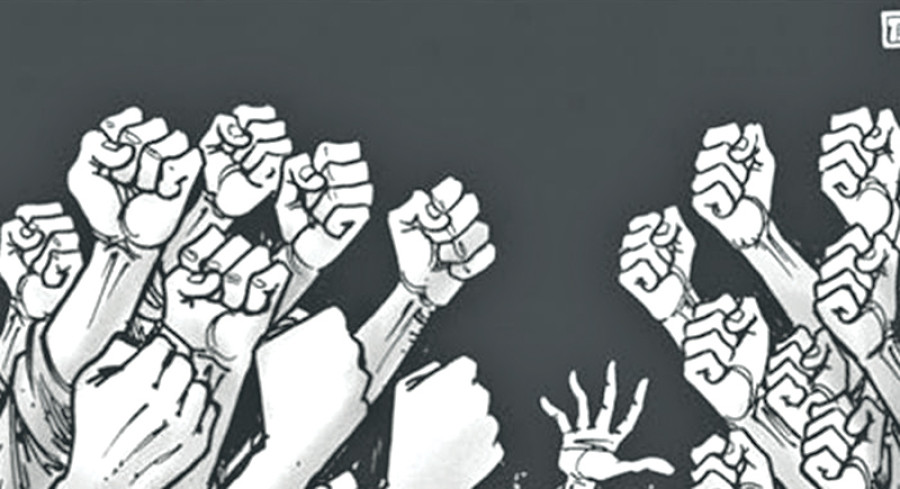Opinion
The amendment farce
After the unification of six Madhes-based parties, the commander of the alliance Mahantha Thakur came to Biratnagar on April 23 and spoke at a mass rally, declaring that the constitution should be amended before holding local elections.
Randhir Chaudhary
After the unification of six Madhes-based parties, the commander of the alliance Mahantha Thakur came to Biratnagar on April 23 and spoke at a mass rally, declaring that the constitution should be amended before holding local elections. At the end of the programme, I met him at the Swagatam Hotel and asked him, “Are you really going to oppose the election if it happens without addressing your demand?” He said, “See, our politics has been trapped. The constitution is not going to be amended.”
After several futile attempts to address the demands of Madhesis through negotiations, the government and the Rastriya Janata Party Nepal (RJPN), a unified forum of Madhesi parties, decided to put the bill to a vote. The Madhes-based parties have already said that the results of the voting in the House would be acceptable to them. The question is why did the RJPN not say this during the first- and second-phase local elections? How can the leaders associated with the party be so myopic? Even though the amendment bill was not approved because it was 48 votes short of the required two-thirds majority, the RJPN is joining the third-phase local elections which is going to be held only in Province 2.
Losing faith
The decision to participate in the polls, which is being held in only one province, has alienated RJPN leaders who belong to Provinces 1 and 5. In this regard, Rakesh Roshan Yadav, a frontline leader of the RJPN who vigorously took part in all the protests held by the Madhes-based parties, told me, “Our party has politically victimised us. We not only feel alienated, we are losing our organisation at the grassroots too. We are compelled to rethink our faith in the RJPN.”
After the RJPN decided to take part in elections, the so-called national parties seem to be happy that the country has emerged from a political deadlock. Meanwhile, Prime Minister Sher Bahadur Deuba defended the remarks he made in India that the parties in government would come up with another fresh amendment bill in Parliament to accommodate the concerns of all groups of people.” Does not it clearly show that an amendment to the constitution is of the utmost importance to bring political stability in Nepal? Indeed, it shows this, but the older and larger parties of Nepal do not think so.
After the Federal Socialist Forum Nepal (FSFN) took part in elections, and the RJPN’s decision to join elections, a discourse has spread in Madhes that there aren’t any Madhes-based parties. When the FSFN and RJPN say that they will continue their protests and also take part in elections, it sets off laughter among Madhesi people. Madhesi parties have misused the sentiments of thousands of Madhesi youths who took part in all Madhes movements. Basically, the latest Madhes movement had been initiated by ordinary Madhesis and not any political party. Many Madhesis had hoped that their demands for a constitutional amendment would be addressed, but the strategic immaturity of their leaders resulted in the sentiments of martyrs and Madhesi protesters coming to nothing.
Stepping up
Remaining in Parliament after the 16-point agreement was forged between the so-called national parties was unacceptable to Madhesi intellectuals and youths. Following the recent development of RJPN taking part in the third phase of local level elections, veteran political analyst CK Lal joined a symbolic protest at Maitighar Mandal and claimed “Madhes-centric parties did what they could as per their capacity, but the problems of madhesis in the constitution have not been addressed yet. So, symbolic protests must continue.” At this juncture, it can be said that Madhes-based parties have disappeared under the ground. There are no differences between the so-called national parties and Madhes-based parties.
The dramatic moves of Madhes-based parties have created two kinds of discourse among Madhesi youths. First, why do people remain with those parties under whose movements they have to face the brutality of the state? Being with the Nepali Congress, CPN-UML or Maoist Centre provides more security than being with Madhes-based parties. Second, most youths and apolitical Madhesis and Tharus are tilting towards radical splinter forces who are actively making inroads into the community following the failure of these parties.
Last but not least, historically genuine issues have not been assimilated by development slogans and tools like elections. If Kathmandu seeks a ‘dead peace’, then it can be happy. Otherwise, it should be serious about dealing with the lingering unaddressed issues of marginalised communities. The CPN-UML should be more responsible towards the country instead of describing the amendment as an anti-national document.
Chaudhary holds a Bachelor of Laws degree




 14.12°C Kathmandu
14.12°C Kathmandu










